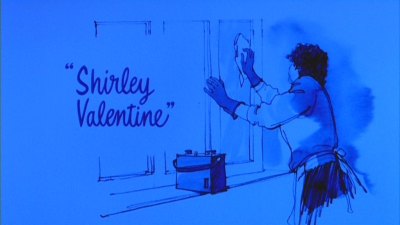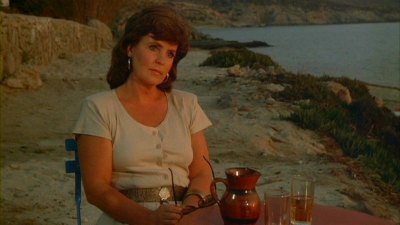| Reviews & Columns |
|
Reviews DVD TV on DVD Blu-ray 4K UHD International DVDs In Theaters Reviews by Studio Video Games Features Collector Series DVDs Easter Egg Database Interviews DVD Talk Radio Feature Articles Columns Anime Talk DVD Savant Horror DVDs The M.O.D. Squad Art House HD Talk Silent DVD
|
DVD Talk Forum |
|
|
| Resources |
|
DVD Price Search Customer Service #'s RCE Info Links |
|
Columns
|
|
|
Shirley Valentine
Shirley Valentine, the 1989 film adaptation of the hit London and Broadway play about a bored English housewife and her personal reawakening during a trip to Greece, comes to DVD in a sparkling new transfer. Pauline Collins, an unfamiliar face to most moviegoers in 1989, received a lot of attention for her Oscar-nominated role here as the downtrodden Shirley (she had originated the role on stage), who gradually realizes her life, such as it is, is quickly passing her by, and that she had better do something about it before it's too late. Ably supported by Tom Conti as an amorous Greek bar owner, Shirley Valentine takes the familiar tale of a middle-life crisis, and tries to keep it honest (most of the time), even though it's rarely balanced or even fair, while, despite its "opening up" for the screen, often remaining determinedly stage-bound.

Shirley Bradshaw (Collins) lives a comfortable, yet maddeningly routine and unvaried life as a Liverpoolian housewife. Things have become so bad for Shirley, who feels disatisfied and unfulfilled, that she's taken to addressing the kitchen wall (which one assumes she faces much of her day, cooking and cleaning) as Wall, telling her troubles to it -- and to us (Shirley also addresses the audience directly, breaking the fourth wall and letting us in on her thoughts and feelings). Her husband, Joe (Bernard Hill), a business owner, appears relatively indifferent to Shirley's plight (although to be fair, the film never shows her attempting to explain her troubles to Joe). His main source of irritation is when Shirley deviates from his strict weekly dinner menu; when she fails to deliver steak on Thursday, a rather nasty fight erupts, and Shirley confirms an earlier decision she made was the right one.
Earlier, a friend, Jane (Alison Steadman), told Shirley that she had an extra ticket for a two week trip to Greece, and she invited Shirley to go along. Shirley, amazed at her own audacity in breaking away from her needy yet controlling husband for two weeks, dithers about going, but when faced with Joe's stiff-necked opposition, as well as an aborted return home by her grown daughter (who thinks Shirley's trip is "disgusting" for a middle aged woman), Shirley does the unthinkable and leaves home -- but not before cooking all of Joe's dinners in advance and freezing them for him.
Once in Greece, Shirley finds that traveling alone can be just as lonely -- if not more so -- than staying at home. Jane immediately shacks up with another tourist, and Shirley is left to make a new friend on the beach: Rock (yes, like inanimate wall Wall, Rock is a huge rock on the beach). Leaving behind the other nosey tourists who pity her, Shirley wanders off to a nearby seaside bar, and requests a table right at the surf's edge. She tells the owner that it will make one of her dreams come true. Sensing a lonely foreign tourist, the bar owner, Costas Caldes (Tom Conti), talks with Shirley, convincing her that she should come with him the next day on a boat excursion around the island. Of course he promises no funny stuff, but of course, he's lying, and sure enough, his quiet charm works on Shirley and they initiate a sexual fling. Feeling liberated, Shirley must make some tough decisions when it comes time to return home from her trip.
When Shirley Valentine came out, I remember quite a few critics and fans discussing it like it was some kind of raucous comedy, with Collins spitting out venomous one-liners like a jacked-up British Neil Simon character. I skipped the movie when it premiered, but watching it today, it seems much more laid back than its previous reputation implies. Quite often, Shirley does go for the rim-shot quip, but it's all rather low-key, really, with a British reserve that feels more like Ealing than Simon territory. Unfortunately, Shirley Valentine doesn't have the impish charm -- as well as the smart-cookie wit -- of an Ealing Studio comedy; it often plays just like what it is: an "opened up" one-woman play that probably worked better on the stage.
Every time a movie uses a character that breaks the fourth wall, a whole new crop of viewers suddenly feel like they've discovered something terribly new, but in Shirley Valentine, it's one of the least successful uses of it I've seen. It's not that Collins can't pull it off; she's a sly one, with a bit of a twinkle in her eyes that's infectious. It's just that the process is infrequent, so when it does come back after a lull, after we've started to view the film as a film again, we're reminded by her comic asides to the camera that we're watching a filmed play. And frankly, the things she's made to say don't ring true in a cinema world. Watching a play, the audience readily accepts characters speaking out to the void, or to us directly, as a theatrical means of expressing thoughts. But in film, it's a far trickier technique, especially if what's being said is at times unbelievable (Michael Caine's Alfie did it expertly). Watching Shirley greet her kitchen wall never feels believable (or the equally stupid "Rock"), and just comes off as a stagy trick that they should have left out of the film version. Other sequences in Shirley Valentine feel theatrically clunky, as well, including a largely awkward scene with Joanna Lumley as a childhood schoolmate who's become a prostitute (perhaps it worked better as a verbal remembrance by Shirley on the stage). Casting good actors in roles that were only heard about but not seen on the stage doesn't make a one-woman stage show into a fully integrated film.

Filmic technique aside, there are quite a few things in the Shirley Valentine script that might strike some viewers as awkward, as well. While it's difficult not to get into the spirit of Shirley's rebellion against her seemingly stagnant emotional prison (aided no doubt by Collins' bright performance), nagging questions of motivation do pop up because the film plays fast and loose with the other peripheral characters. One of the reasons it might be easy to side with Shirley is because everyone else in the film is portrayed as a flat, cardboard comedic target. Joe is seen only as an emotional thug, flipping his dinner into Shirley's lap. When we do get a brief flashback of him acting decently (when Shirley remembers their initial happy times), it's fleeting, and no explanation is given as to how or why he turned out the way he did (it's interesting that Shirley says they both used to laugh in their youth, but she -- and the film -- only blame him for stopping. Maybe he stopped when she stopped?). Shirley's annoying neighbor is one-dimensionally pompous, obviously functioning as a springboard for Shirley's contempt. And Carlos turns out to be exactly what the film wants to trick us into thinking he's not: a genial predator of bored, romance-starved foreign travelers (the cliched gauche British tourists are facile, as well). It's easier to put forth Shirley as a downtrodden victim who rebels against her station in life, when the screenwriter has put up such one-dimensional obstacles to her path towards personal redemption. How much more rich the film's conflict could have been if everything in Shirley's life appeared relatively normal -- and she found she was still unhappy.
But where Shirley Valentine does work very well, is in getting across that feeling that I suspect everyone gets once over the course of years, where they look back, and wonder how they became who they are in life. How you became the "you" you are now, and how different that person is from the "you" you used to be. There's a marvelously sad and poignant flashback to Shirley's schooldays, where the piss-and-vinegar Shirley is gloriously young and alive and willing to face any challenge -- back when she says, "I was Shirley Valentine, not Shirley Bradshaw." I think everybody over the age of 25 or so can relate to a moment like that, where you realize how far you may have strayed from the kind of young adult you used to be, and this particular sequence is most successful at getting across that lump-in-the-throat sudden awareness of how someone might have settled for far less than what they're capable of enjoying.
And that's the successful part of Shirley Valentine. Collins is quite touching in her scenes where she comes to the inescapable conclusion that she's settled for far less than she should have. Not necessarily that she married the wrong man, but that she's let her life slip into an emotional vacuum, and that she needs to get back to that young Shirley Valentine's attitude of taking life on her own demanding terms. At times, the film can be fairly honest, too, with the emotional drawbacks of such an experimentation with life. Shirley is well aware that Carlos is a liar, but she's willing to go along with the affair to jump-start her emotions, to kick her back into the realm of senses that she's been deadened to. And there's no guarantee that her final gambit with Joe will pay off the way she -- or perhaps more accurately, the audience -- would like. Despite the one-sided easiness of most of Shirley Valentine's targets, there's no denying the depth of some of the truths do come out of this funny, sad comedy.

The DVD:
The Video:
The anamorphic 1.85:1 widescreen video image for Shirley Valentine is quite lovely, with deep, rich, true color (the skin tones are particularly subtle in the Greek sequences), and blacks that hold.
The Audio:
Here's where things get a little weird. The disc offers two Dolby Digital 5.1 Surround mixes: one labeled "US English," and the other "UK English." My first thought when seeing that was perhaps the US version is a dub, with different vernacular or perhaps even different scenes with different dialogue. Upon watching both, and flipping back and forth between the two, I could find no difference. Even watching for lip movements, where dialogue was obviously looped in post-production, I couldn't tell any difference between the two mixes. If someone knows what's up with these two supposedly different tracks, email me. There's also a French 2.0 Surround mix, and English subtitles available.
The Extras:
There are no extras for Shirley Valentine -- not even a trailer. Too bad; I'll bet Collins would have been a hoot on a commentary track.
Final Thoughts:
Manipulative, stagy, and maybe not even fair, Shirley Valentine still achieves a depth of feeling in its familiar mid-life crisis story, mainly through the thoughtful, emotionally true performance by Pauline Collins. It's funny, but mostly sad, and certainly worth your time. I recommend Shirley Valentine.
Paul Mavis is an internationally published film and television historian, a member of the Online Film Critics Society, and the author of The Espionage Filmography.


|
| Popular Reviews |
| Sponsored Links |
|
|
| Sponsored Links |
|
|
| Release List | Reviews | Shop | Newsletter | Forum | DVD Giveaways | Blu-Ray | Advertise |
|
Copyright 2024 DVDTalk.com All Rights Reserved. Legal Info, Privacy Policy, Terms of Use,
Manage Preferences,
Your Privacy Choices | |||||||














